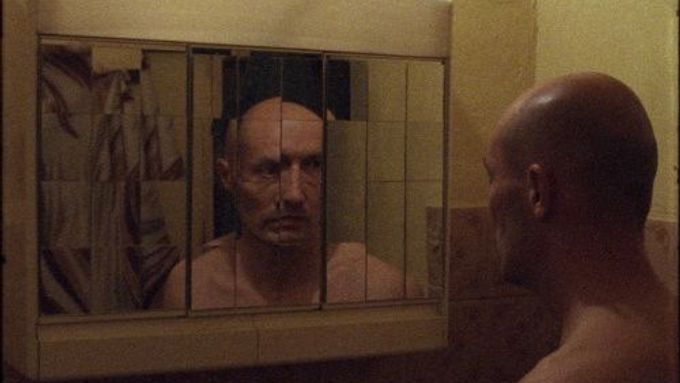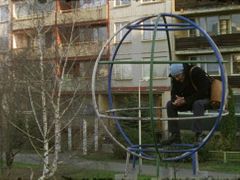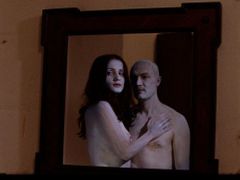Review - The two latest Czech films represent the extreme poles of Czech cinema. While Viktor Taus's Sněženky a machři po 25 letech (Snowdrops and Aces after 25 Years) is a typical product of a profit-oriented film business, Vít Pancíř's Sestra (Sister) embodies something we haven't seen on Czech screens for quite a while: art without compromises.
Based on Jáchym Topol's 1994 novel Sestra (City, Sister, Silver) and an album of the same title by a Czech alternative band Psí vojáci, the film is unlike anything else in the Czech cinematography. It is heavy with meaning and reminds us that film should, above all, affect the depth of our souls; that it should excite and hurt, move and terrify.
Sestra is by no means a boring film - it is only not served on a silver plate. It demands the participation of the viewer who should approach the film with an open and accommodating mind in order to connect with the film, seize it and reap from it as much as possible.
From story to image
Those hoping Sestra will reiterate Topol's famous novel, translated into English by Alex Zucker, will most likely be disappointed. Fully aware that the long and complex novel defies film adaptation, film maker Pancíř, with Topol's assistance, only preserved its backbone.
As a result, we can simply label Sestra as a film about love and we don't have to think much about whether the viewers know the book at all. After all, Topol himself says that many people know his novel, but few have finished reading it.
Rather than retelling the story of this highly plot-less and introspective book, the film is mediating its atmosphere, comprising a furiously poetic and tenderly brutal mixture of nostalgia and desire of the early 1990s that somehow remains alive even today.
Creek meets Black
The film's main protagonist, Potok (Creek), meets Černá (Black), a mysterious femme fatale with whom he then rushes through the world. Devoid of pseudo-funny catchphrases typical of other Czech films, Sestra offers an engrossing initiation journey through a love relationship towards a loss of youth ideals and desires.
While Sestra clearly reveals the director's roots in experimental cinema, it is not another unbearable, purely formalist film that annoys rather than delivers a message. Deep inside Sestra there is a beating heart and a glowing desire.
An obvious comparison could be made with earlier films based on Topol's writing, namely Zdeněk Tyc's Žiletky (Razor Blades) from 1994 and Vladimír Michálek's Anděl Exit (Angel Exit) from 2000. While these earlier films significantly exceeded the average quality of Czech cinema, Sestra has gone farthest of the three in their retreat from storytelling to imagery.
A flux of images
Those used to the gushy visual aesthetics of typical Czech films may be shocked by Sestra, which is based on strong images, contrasting cuts and sophisticated montages, as well as analogies.
The film first appears to simply juxtapose images: See all those shots of windows, mirrors reflecting the protagonists' world, those glances through someone else's living room or backyard, those curious gazes of strangers' eyes.
Its atmosphere is evoked by old classroom photographs, shots of silent mannequins in Christmas-time shop windows, wild battles between modern toys and old Native American figurines, glances into eyes and glances into the city, which is as ferocious, dangerous and unpredictable as the girl who has invaded the hero's life.
Unfettered and wild as wolves
All these images are rushing forward and the pace of the dynamic cuts is almost hard to keep up with. Sister is as unfettered and wild as a pack of wolves and as honest as the hero's gaze in the mirror, reflecting his spiritual disposition better than the missing dialogues.
It is a direct blow without all those comforters, contrivances and dodges which have become so customary that their absence may disconcert the viewer.
And then, there is the music. The ingenious music of Psí vojáci, with its lyrics based on Topol's novel and uttered by the hypnotic voice of Filip Topol, the novelist's brother. The music and the engrossing stream of imagery make Sestra the most emotional film of the year.
It needs to be said that the film is not for everyone. Those who will let Sestra speak to them, will enjoy a rare experience. Being infected by Sestra means being choked and weighed down and at the same time excited and elevated.
You can read the first chapter of City Sister Silver in English here.
Sestra, Czech Republic, 2008
Script and directed by Vít Pancíř
Based on a novel by Jáchym Topol
Camera Martin Čihák, editor Adam Brothánek
Music by Psí vojáci
Starring Jakub Zich and Verica Nedeská
Run time 70 minutes
Distribution Artcam
Premiere 11 December 2008



